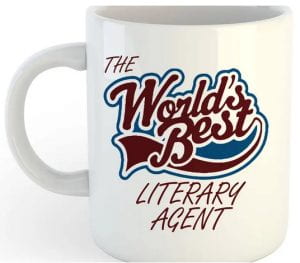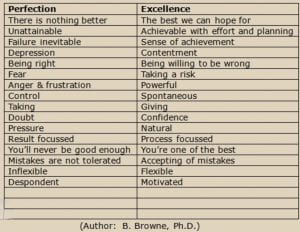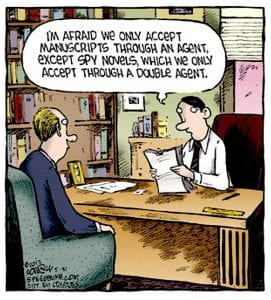 I had to laugh when I made this new post. Why? because, I don’t yet have a literary agent for my new thriller. However, I worked closely with a publishing editor (MacMillan’s) and enjoyed this list—edited from an article by Nathan Bransford (link here).
I had to laugh when I made this new post. Why? because, I don’t yet have a literary agent for my new thriller. However, I worked closely with a publishing editor (MacMillan’s) and enjoyed this list—edited from an article by Nathan Bransford (link here).
1. Your literary agent should have a proven track record of sales and/or works at a reputable agency
This is far from the only criteria for determining whether you have a good agent, but it’s a mandatory starting place. A good agent should have either a track record of sales to major publishers or have a good deal of experience cutting their teeth at a reputable agency or both.
2. Your literary agent should be a good communicator
When you have a question, your agent answers. When you ask for something, your agent delivers. When you want to have a serious conversation, the agent is there to have it. A good agent doesn’t dodge, doesn’t hide, is straightforward with you and tells you things you may not always want to hear. If you feel like you are constantly pulling teeth to get the most basic questions answered, you may not have a good agent. The communications lines need to be open between author and agent.
3. Your literary agent should be able to explain every question you have about your contract or your royalty statements
Publishing contract clauses can be confusing, royalty statements borderline indecipherable. Your agent should know exactly what they mean and be able to explain them to you.
4. Your literary agent is completely ethical in how they approach their job
A good agent will act ethically and advise you to act ethically. If you see your agent act unethically it’s only a matter of time until you’re on the receiving end.
Know your rights as an author.
5. Your literary agent should pay you on time and send you contracts in a timely fashion
Most agents have clauses that stipulate that publishers send payments to them, then they take their commission and send you the balance. This is normal. However, that means it’s all the more important that they send your payments and contracts to you on time. Be very wary if you encounter delays.
6. Your literary agent charges you a commission of 15% on domestic contracts, 20% on foreign contracts, and deducts very transparently for reasonable expenses like postage and copying
No agent should charge you up front. They only make money when you make money and only charge you separately for things like foreign postage and manuscript copying.
7. You feel comfortable
This is key and was the determining factor when I worked with Macmillan Publishers. My editor was available, professional, keen and helpful. I trusted her. In the same way, you have to trust your literary agent. You have to have a good feeling about them. At the end of the day, having a bad agent is worse than having no agent. You have to be able to have faith that your agent has your best interests at heart and is good for your career.
 ” When I get an idea I just start writing,” says Ascension author Nicholas Binge. “I’m such a discovery writer, I have no idea where I’m going with it.”
” When I get an idea I just start writing,” says Ascension author Nicholas Binge. “I’m such a discovery writer, I have no idea where I’m going with it.”
 Hello again. I was discussing some of the presentations at a recent writers conference with a good friend who attended. He brought up the notion of perfection in writing vs excellence. The aim was to have writers concentrate on excellence and not try to be perfectionists. Writers should feel safe to make mistakes and be innovative. Which then begs the question, what is excellence in writing? I’m not a 100% sure myself. Some say it’s the point where you cannot improve on the story, plot, characters, etc. I agree, but I’m going to stick my writer’s neck out and also suggest that the manuscript being submitted needs to be free of obvious errors, grammatical mistakes, etc. If it isn’t it will be a turn-off for any literary agent or, in the case of self-published work, a negative experience for the reader.
Hello again. I was discussing some of the presentations at a recent writers conference with a good friend who attended. He brought up the notion of perfection in writing vs excellence. The aim was to have writers concentrate on excellence and not try to be perfectionists. Writers should feel safe to make mistakes and be innovative. Which then begs the question, what is excellence in writing? I’m not a 100% sure myself. Some say it’s the point where you cannot improve on the story, plot, characters, etc. I agree, but I’m going to stick my writer’s neck out and also suggest that the manuscript being submitted needs to be free of obvious errors, grammatical mistakes, etc. If it isn’t it will be a turn-off for any literary agent or, in the case of self-published work, a negative experience for the reader. “It’s so simple to let rejections take their toll, but we have to keep dusting ourselves off. After all, if you keep your work to yourself, your chance of anyone liking it is nil, whereas submitting could lead to something great. I’ll take slim odds over none any day of the week. And if you are professional and send your materials to enough people, hopefully you’ll be lucky enough to find the person who loves your work as much as you do!”
“It’s so simple to let rejections take their toll, but we have to keep dusting ourselves off. After all, if you keep your work to yourself, your chance of anyone liking it is nil, whereas submitting could lead to something great. I’ll take slim odds over none any day of the week. And if you are professional and send your materials to enough people, hopefully you’ll be lucky enough to find the person who loves your work as much as you do!”
 I had to laugh when I made this new post. Why? because, I don’t yet have a literary agent for my new thriller. However, I worked closely with a publishing editor (MacMillan’s) and enjoyed this list—edited from an article by Nathan Bransford (link
I had to laugh when I made this new post. Why? because, I don’t yet have a literary agent for my new thriller. However, I worked closely with a publishing editor (MacMillan’s) and enjoyed this list—edited from an article by Nathan Bransford (link 
 “The more I listen to (literary) agents the more I feel like a ribbon on a kite. Which way does the wind blow today?” Many will identify with this comment. After all, one day you Query Letter is not up to the task, the next your word count is too low; another day you chose the wrong sub—genre, and the next you made a grammatical error.
“The more I listen to (literary) agents the more I feel like a ribbon on a kite. Which way does the wind blow today?” Many will identify with this comment. After all, one day you Query Letter is not up to the task, the next your word count is too low; another day you chose the wrong sub—genre, and the next you made a grammatical error.